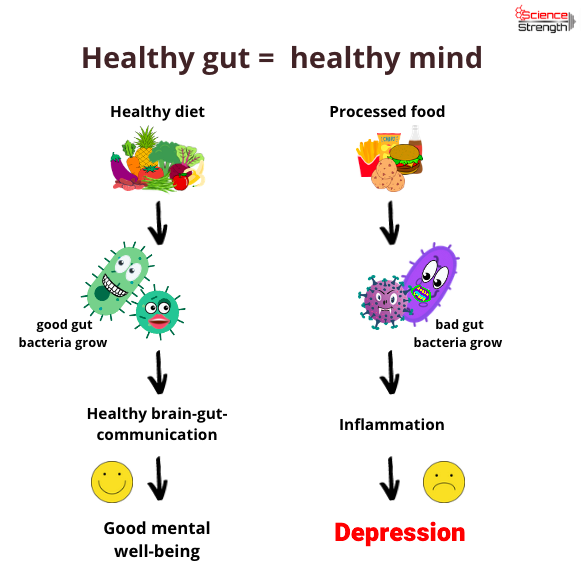Inflammation is the villain.
Inflammatory molecules are key players in depression and other mental and physical diseases, such as cardiovascular diseases, diabetes, obesity etc.
There are several things that can cause inflammation;
stress
isolation and lack of social contacts
shame (read more about it here)
feeling as "being not good enough" (lower social rank)
unhealthy diet based on processed foods
Indeed, a research study found out that people whose major part of calories comes from ultra-processed foods, such as packaged snacks, chips, breakfast cereals, cookies, breads, report 81% more depressive symptoms and 19% more anxious days.
I don’t need to say that processed food is bad and you should eat healthy. It’s common knowledge. But still, millions of people don’t do it. Otherwise we wouldn’t have an obesity epidemic and steadily increasing numbers of mental health problems.
Instead of preaching a sermon how evil processed food is and detrimental to your physical and mental health, I want rather to focus on what you can add to your diet – not on what to avoid - to reduce inflammation and have a positive effect on your mental health.
But first let’s have quick look at the basics first; why processed food is bad and wholefoods good.
To give a very simplistic answer without going much into nerdy science-details; it’s because of our gut microbiota. Processed food, filled with sugar and junk, makes the bad gut bacteria grow. Fiber-rich wholefood makes the good gut bacteria grow.
There is a constant communication between the gut and the brain, called microbiota-gut-brain axis (MGB). The communication happens via hormones, inflammatory molecules, and neurotransmitters. It is not surprising that the molecules produced by bacteria in your gut influence your brain and also your mood.
Unhealthy diet doesn’t only make the bad bacteria grow, but also increases gut permeability. It is a normal – and a good thing – that the gut walls are permeable. Otherwise, we wouldn’t be able to absorb nutrients from food. However, if the gut is too permeable more bad stuff can get into the blood stream, such as toxins and all kind of inflammatory molecules that are produced by the bad gut bacteria.
What can we do against it?
It’s simple: Reduce the number of bad bacteria and increase the population of good bacteria.
One method to do it are probiotic supplements. In the past I have been very skeptical regarding probiotics. Simply, because there wasn’t enough research to make solid recommendations what bacterial species are truly effective. By now there is more research – even though, the data is still scattered, not completely clear and often comes from animal studies. But the collective evidence has convinced me that it may be beneficial to give probiotics a try when it comes to such an important things like mental health than not trying anything at all.
So, when you get a probiotic, what should you watch out for?
Here are species of good gut bacteria that decline in people suffering of depression and we should ideally get from probiotics:
Lactobacillus
Bifidobacterium
Faecalibacterium
Dialister
Most probiotic supplements contain Lactobacillus and Bifidobacterium. When choosing a probiotic, it is important to choose one that contains both. Lactobacillus works in the small intestine and Bifidobacterium in the large intestine. You want to cover your entire intestine.
However, this is not the end of the story. Lactobacillus and Bifidobacterium have many different species, such as Lactobacillus rhamnosus, Lactobacillus acidophilus or Lactobacillus bulgaricus. Which one should you go for?
Here I made a list of the species that were shown to have some beneficial effect on mental health in human studies, if possible choose these or at least some of them:
L. rhamnosus, L. casei strain Shirota, L. plantarum, L. paracasei, L. gasseri, B. breve, B. longum, Clostridium butyricum
Abbreviations: L = Lactobacillus, B = Bifidobacterium
The commonly used dose is 1-10 billion (10^9-10^10) colony forming units (CFUs).
A few words of reason: Even though, I gave you some pointers on what probiotics to choose, please don’t forget that supplements are about supplementation, on top of a proper diet. The package we get from food is complete containing many important components we don’t even know about and can’t mimic with supplements.
Supplements are just the top of an iceberg, a thing that is good to try ‘just in case’ or in emergency case, when getting what we need from real food is not possible.
Speaking of real food…let’s have a look at probiotic-containing real food and how effective it is.
A research study compared the effect of fermented food that naturally contains probiotics with the effect of a fiber-rich diet. Fiber – is prebiotic – food for good gut bacteria that makes them reproduce and their population to grow.
The results were surprising. In contrast to the popular belief and pushing attempts of a fiber-rich diet, an increase in fiber intake didn’t increase the diversity of gut microbiota, nor reduced inflammatory markers.
In contrast, a diet high in fermented foods increased the diversity of gut microbiota and reduced inflammatory markers, which are the villain we want to fight!!
This doesn’t mean that increasing fiber intake is a bad thing. The fiber group experienced an increase in fiber digesting enzymes, which in turn could lead to an increase in gut microbiota diversity long-term. However, the research study already took 10 weeks. How much longer do we want to wait to see beneficial effect?
Thus, fermented food is the new fiber. It’s the thing!
Practical applications:
What fermented foods that contain probiotics:
Dairy products/ plant-based replacements: yogurt, kefir, fermented cottage cheese
Vegetables: fermented vegetables, such as sauerkraut or pickles, vegetable brine drinks
Traditional soy products: miso, tempeh,
Drinks: kombucha, and other fermented non-alcoholic drinks
Pay attention that fermented foods you buy contain “live cultures” or “active cultures” (check the label). This means that the microorganisms weren’t killed by heat (e.g. pasteurization) or by the addition of anti-microbial agents, such as vinegar or different sulfites.
How much to eat:
In the research study the participants ate on average 6 servings a day. Each serving was about 4-6 oz / 110-170 g.
This is a lot of fermented food, e.g. up to one kilogram sauerkraut every day!
Luckily, the beneficial effect of the fermented food was more related to the duration of consumption than the amount consumed.
I plan to stick to the lower side of the serving size range. I personally would go for one soy yoghurt, 170 g tempeh, 120 g sauerkraut and 150 g pickled vegetables a day. This amount of fermented food is doable for me and relatively easy to add to my diet.
Additionally, it is important to spread the fermented food intake throughout the day rather than consuming all of it in one sitting and also allowing your body to get used to it. In the research study, there was a ramp-up period of 4 weeks, in which subjects gradually increased the amount of the fermented food to avoid digestive distress.
A few more cool things the research study found I want to point out:
Eating fermented food didn’t only increase the number of good bacteria these foods contained, but also of other species. This suggests an overall beneficial effect of fermented food on gut microbiota. As I mentioned before in the supplement section; real food is a complete package. We can’t just isolate some parts of it and expect the same effect.
The subject added fermented food on top of their habitual diet. They didn’t make their diet healthier or increased their fiber intake. I don’t suggest here to eat a shitty diet and trying to make up for it with putting sauerkraut on your pizza. I just want to say that it doesn’t ask for any drastic changes from your side to make your gut healthier, decrease inflammation and potentially improve your mental health. I don’t ask you to remove anything, just to add more good stuff.
Speaking of good stuff: In ideal case you should also add prebiotics and not only probiotics to your diet, because prebiotics is what your probiotics feed on. Good prebiotics choices would be asparagus, artichokes, bananas, oatmeal, leeks, chicory root, and beans.
To sum up:
Inflammation is the villain
To fight inflammation on the dietary level you need to keep your gut bacteria healthy
You do this by addition of fermented foods to your diet that contains “live/ active cultures”
Eat up to six 110-170 g servings of fermented foods spread throughout the day ramping up your intake slowly
Keep probiotic supplements in your tool kit for the case of emergency (e.g. after antibiotic treatment, or after binge drinking or huge cheat meals to bring your gut microbiota back in balance)
If don’t know how to improve your mental health and what to eat for a healthy mind and body, I am happy to consult you and create a meal plan individually for you. Click here to learn more about my consultation program.


